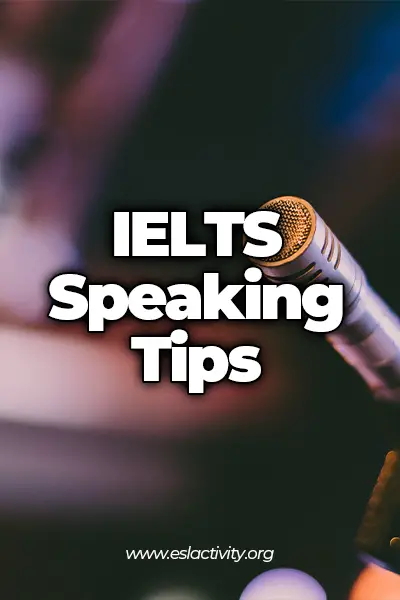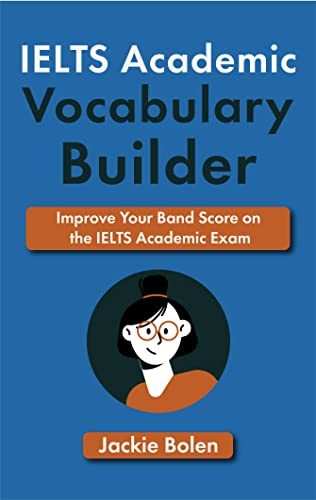The IELTS exam is becoming increasingly important for jobs or educational opportunities. There is a ton of information available on the Internet about how to improve your score on the IELTS speaking test, but you need to consider the source. Not all tips are created equal! Check out these IELTS speaking tips and tricks to ace your exam!
In this article, we’ll share our top tips and tricks for the IELTS speaking test. Some are obvious, but worth pointing out, while others are less so.

IELTS Speaking Tips
IELTS Speaking Exam
The IELTS speaking test examines the ability to communicate in English. The test is divided into 3 parts and it takes about 11-14 minutes in total. Part 1 asks some general questions about yourself. Part 2 asks you to talk about a topic for 1-2 minutes. Part 3 asks more in-depth questions about the topics related to the ones discussed in Part 2.
The examiner will assess fluency and coherence, organization of your thoughts, use of vocabulary and grammar, accuracy, and pronunciation. There is a lot to consider. So, you might feel lost and not know where to begin. We recommend going through these tips for the IELTS speaking exam.
- Amazon Kindle Edition
- Bolen, Jackie (Author)
- English (Publication Language)
- 286 Pages - 04/06/2023 (Publication Date)
Tips for IELTS Speaking
Ready for the tips for IELTS speaking? Let’s go!
#1: Add some Details for the IELTS Speaking Test
The first tip for speaking IELTS is to use descriptive details and personal anecdotes to make your answers more interesting. This is more important in Parts 2 & 3 than in Part 1. In Part 1, your answers should be short and quick, 2 to 3 sentences maximum; you won’t have much time to speak.
But in Part 2, you do all of the talking and in Part 3, you should do more talking than the examiner (but, again, don’t talk incessantly, or on and on; you must follow the examiner’s lead). This is where it’s good to expand your answers; you want to keep talking and fill in the time effectively.
This is a good opportunity to talk about your feelings and opinions; it’s important to understand that there’s no right or wrong answer. You need to be able to communicate your ideas effectively, no matter what they are.

How to improve IELTS speaking
#2: What to do If you Don’t Know About the Topic
Second, if you don’t know anything about a topic or the topic is uncomfortable, use short answers or, better yet, lie. Yes! You can indeed lie on the IELTS speaking exam. Using short answers won’t work in Part 2, where you must continue talking for 2 minutes.
You might get away with it in Part 3, as long as you don’t do it repeatedly. However, if you lie about a topic, this is ok; you’re being tested on your ability to communicate your ideas, not whether your ideas are right or wrong.
Occasionally, I ask students how they feel about a certain sport, say basketball, and the students reply that they don’t like basketball or sports (all sports). I can’t change the question, but a candidate could say that they don’t like basketball and then say why they don’t like it. They could make up facts about basketball that aren’t true, but this would still be irrelevant to the discussion, as long as they continue to discuss why.
I’ve seen candidates falter in the past when talking about a parent or grandparent who had recently passed away; this is difficult to watch because the topic can’t be changed after it’s been assigned. But you could talk about a pleasant memory involving the grandparent when they were still alive. Using a positive past memory might help you overcome the emotion you feel about losing them. This isn’t necessarily lying, but as long as you continue to talk coherently, it’ll achieve your purpose.
This is one of my top tips for IELTS tips speaking.
#3: Big Words – Make sure you Use them Correctly
Third, if you use big words or idioms on the IELTS speaking test, make sure you understand them and know how to use them properly. Many candidates like to “dictionary shop” for big, complex words, but this is a bad idea. The dictionary doesn’t show you how to use the words in a sentence.
Candidates also don’t understand that most native speakers don’t use fancy, complex words, but instead rely on collocations and colloquialisms.
For example, native speakers often say:
- Merry Christmas
- Happy New Year
We would never say:
- Happy Christmas
- Wonderful Christmas
- Merry New Year
Even though happy, wonderful, and merry all mean essentially the same thing, we just don’t say things that way. Wishing someone a “winsome Christmas” will only get you strange looks and no response. Don’t feel like you have to say something special. Our tip is to go with the regular collocations.
Related: Practice Speaking English: Tips for ESL/EFL Learners.
Check out this video for even more speaking tips IELTS:
#4: Use Synonyms and Conjunctions in the IELTS Speaking Exam
Fourth, use synonyms & conjunctions to make your speech more interesting during the IELTS speaking exam. Using the same word, again and again, indicates that you have a limited vocabulary. If you’re talking about your brother or sister, refer to them using words like “sibling”, “relative” or “kin”.
Conjunctions also make your speech more interesting and easier to listen to. The only difference between a simple and a compound sentence is words like “and”, “but”, “for”, etc. By using simple conjunctions, you have improved your grammar and your score. If you edit two sentences and make them one sentence, you have turned simple sentences into complex sentences; your score will be even better.
#5: Match Grammar in Question and Answer
Fifth, always match the questions’ grammar in your response. This is one of the most important tips for speaking IELTS. We’ve mentioned this earlier, but it bears repeating; it’s your ability to communicate effectively that’s being tested. Small mistakes that don’t confuse the listener are often ignored, as long as we know or can guess what you meant to say.
But responding to a question about a sport you played as a child by describing the hockey team you play with now on weekends will confuse the listener (the examiner in this case). It’ll demonstrate that you don’t fully understand the question, which usually leads to misunderstandings and poor communication.
Related: English Reading Test Tips for ESL/EFL Students

IELTS tips for speaking
#6: Check the British Council Website for IELTS Tips Speaking
There are a lot of resources on the Internet today that focus on the IELTS exam or specific exam parts. It’s hard to know which sources are better, especially if you’ve never taken the exam. So it’s important to research a school or website before you sign up, and try to determine which ones are credible.
Obviously, the best resources for informing yourself about IELTS are the British Council websites. These sites will tell you everything you need to know about the exam; they even offer practice materials and mock exams you can take before you sit the real exam.
You’ll also see from the British Council websites that the IELTS exam has its own very specific vernacular or jargon; there are very specific words and phrases used to talk about the exam, such as “examiner”, “invigilator”, “exam venue”, “bands”, and so on.
If someone refers to the examiners as “administrators”, there is a good chance this person isn’t as knowledgeable about the exam as they’re pretending to be. If you come across a website or a live school or IELTS teacher who isn’t familiar with the correct terminology, don’t walk but run, as fast as you can, in the other direction.
Related: How to Speak English Fluently: Learn more Vocabulary
#7: Never Memorize Answers
Some students try to memorize common answers that they think they might hear during the exam. Examiners are trained to detect this, and you will get a very low score if you do this (Band 1-2). It’s just not worth it!
Of course, practice answers to some common questions and have a few ideas and words in your mind but don’t memorize things at the sentence so paragraph level. It’s always obvious!
#8: Accents Don’t Matter
Don’t worry about your accent. As long as the examiner is able to understand you easily, your accent doesn’t matter.
What does matter is if your accent is so thick that it’s difficult to understand you when you speak English. Or, if you don’t use the correct pronunciation for English words.
#9: Time to Think is Okay
If you take a second or two to begin speaking, you won’t lose points for that. Take a deep breath and think of how you’ll start. It’s really no problem at all. You can use phrases like:
- That’s a good question . . .
- Let me think . . .
- That’s a difficult question but I’ll try to answer it well!
- That’s a good point. But/however . . .
Of course, don’t take too long to think about every single question because you’ll run out of time for your exam and not have said that much!
#10: Avoid Fillers
Fillers are words like:
- um
- ah
- you know
- well
- like
- yeah
Speak precisely without these “nothing” words and you’ll get a higher score.
- Amazon Kindle Edition
- Bolen, Jackie (Author)
- English (Publication Language)
- 353 Pages - 05/02/2022 (Publication Date)
FAQs About IELTS Speaking Tips
There are a number of common questions that people have about this exam. Check out the answers to some of the most popular ones for tips for IELTS speaking.
How can I get a 9 in IELTS speaking?
It can be very, very difficult to get a 9 in IELTS speaking, even if you’re a native English speaker. The good news is that you will almost never be required to attain this. Most English-speaking jobs or universities only require something like a 5,6, or 7 (check specific requirements).
How do I get good at IELTS speaking?
To get good at IELTS speaking, you’ll need to do the following:
- Don’t memorize answers. This won’t help you!
- Learn phrases, expressions, and idioms and know how to use them.
- Become familiar with the most common topics.
- Avoid using fillers (um, ah, etc.).
- Ask for the question to be repeated, if necessary.
- Expand on your answers with some details but don’t talk too much.
- Use a variety of vocabulary words and grammatical structures.
Is IELTS speaking easy?
IELTS speaking is a very structured exam, so most people find it quite stressful and not that easy. It is, however, easy to get a lower band score like 4 or 5 if you’re okay with using English. It’s a lot more difficult to get a 7, 8, or 9. You’ll need to have advanced level English speaking skills.
What does IELTS speaking include?
The IELTS speaking test includes 3 parts and it’s conducted as an interview with an examiner. It takes between 11 and 15 minutes and will include simple questions/answers, a monologue and then more in-depth questions.
Which part of IELTS is most difficult?
According to surveys, people find the writing portion of the IELTS exam most difficult, closely followed by speaking. Most people find the production tasks (speaking, writing) more difficult than the receptive tasks (listening, reading) in any language exam.
Can I retake IELTS speaking only?
You generally can’t retake the IELTS speaking exam only. If you want to take the exam again, you’ll have to do all four parts (speaking, listening, reading, writing) at the same time.
Why is IELTS speaking so difficult?
The IELTS speaking exam is so difficult because you don’t know the topics and questions ahead of time. You’ll also get penalized heavily for memorizing answers so this can make it a little bit difficult to prepare for. It’s designed to be an accurate test of someone’s English speaking ability.
How Can I Get Band 8 on IELTS Speaking?
To achieve a Band 8 score on the IELTS Speaking test, you need to demonstrate a high level of proficiency and meet specific criteria. Here are some tips to help you prepare effectively:
Familiarize yourself with the test format
Understand the structure of the IELTS Speaking test, which consists of three parts – Introduction and Interview, Individual Long Turn, and Discussion. Knowing what to expect will help you feel more confident during the test.
Improve your English language skills
Work on enhancing your vocabulary, grammar, pronunciation, and fluency. Read extensively, listen to English audio, practice speaking with native speakers or fluent speakers, and consider taking English language courses or working with a tutor.
Understand the assessment criteria
Familiarize yourself with the IELTS Speaking band descriptors. These descriptors outline the specific skills and criteria the examiners use to assess your performance. Aim to meet the requirements for a Band 8 score.
Expand your vocabulary
Use a variety of vocabulary, including idiomatic expressions, collocations, and academic terms. Incorporate specialized vocabulary related to your field of study or work, as appropriate. Avoid using repetitive words and phrases.
Develop coherence and cohesion
Organize your thoughts in a logical and structured manner. Use linking words and phrases to connect your ideas, create smooth transitions between sentences and paragraphs, and ensure your speech flows naturally.
Speak with clarity and fluency
Practice speaking at a natural pace with clear pronunciation. Work on reducing hesitations, pauses, and speech errors. Develop the ability to speak at length without losing coherence or straying off-topic.
Provide detailed and relevant responses
When answering questions, provide specific examples, details, and explanations to support your ideas. Avoid giving brief or general answers. Show the examiner that you can express yourself clearly and concisely.
Demonstrate flexibility in language use
Showcase your ability to use a wide range of grammatical structures accurately. Incorporate complex sentences, different tenses, conditionals, and passive voice constructions when appropriate. Aim for accuracy and precision in your language.
Practice under exam conditions
Familiarize yourself with the timing constraints of the IELTS Speaking test. Practice speaking within the allocated time for each section. You can find sample questions online or work with a tutor who can simulate the test environment for you.
Seek feedback and guidance
Practice with a partner or tutor who can provide constructive feedback on your performance. They can help you identify areas for improvement and provide guidance on how to enhance your speaking skills.
Tips for IELTS Speaking: Join the Conversation
Do you have any tips or tricks for improving your score on this English proficiency test? Leave a comment below and let us know what you think. We’d love to hear from you about anything tips for speaking in IELTS.
Also, be sure to give this article a share on Facebook, Pinterest, or Twitter. It’ll help other English learners like yourself find this useful resource.
Last update on 2022-07-17 / Affiliate links / Images from Amazon Product Advertising API






